Exams, Study guides, Reviews, Notes
Hit me up for all study resources and materials on any course.
- 675
- 1
- 38
Community
- Followers
- Following
37 Reviews received
693 items
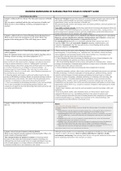
NUR2058 DIMENSIONS OF NURSING PRACTICE EXAM #1 CONCEPT GUIDE
NUR2058 DIMENSIONS OF NURSING PRACTICE EXAM #1 CONCEPT GUIDE Care Why are nurses considered both the glue and conscious of health care? What role does critical thinking, reasoning, and judgement play in nursing? Nurses are “the glue” because they hold care systems together. In many case, nurses are the only regular, qualified health care providers consistently available. Through their organizations, nurses are the conscience of health care. They promote health, monitor and manage acute and...
- Book
- Summary
- • 8 pages •
NUR2058 DIMENSIONS OF NURSING PRACTICE EXAM #1 CONCEPT GUIDE Care Why are nurses considered both the glue and conscious of health care? What role does critical thinking, reasoning, and judgement play in nursing? Nurses are “the glue” because they hold care systems together. In many case, nurses are the only regular, qualified health care providers consistently available. Through their organizations, nurses are the conscience of health care. They promote health, monitor and manage acute and...
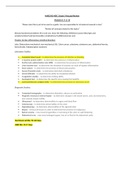
NUR2392 MDC 2 Exam 3 Focused Review Modules 8, 9, & 10
NUR2392 MDC 2 Exam 3 Focused Review Modules 8, 9, & 10 NUR2392 MDC 2 Exam 3 Focused Review Modules 8, 9, & 10 *Please note this is just to be used as a guide. You are responsible for all material covered in class* *Review all concepts related to the topics* Disease/syndromes/problems (For each one, know the following: definition/causes/risks/signs and symptoms/labs/treatment/possible complications/multidimensional care) Chapter 56 Non-inflammatory intestinal disorders Labs, Obstructions...
- Package deal
- Summary
- • 14 pages •
NUR2392 MDC 2 Exam 3 Focused Review Modules 8, 9, & 10 NUR2392 MDC 2 Exam 3 Focused Review Modules 8, 9, & 10 *Please note this is just to be used as a guide. You are responsible for all material covered in class* *Review all concepts related to the topics* Disease/syndromes/problems (For each one, know the following: definition/causes/risks/signs and symptoms/labs/treatment/possible complications/multidimensional care) Chapter 56 Non-inflammatory intestinal disorders Labs, Obstructions...
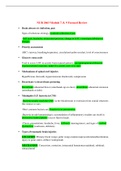
NUR2063 Final Exam Focused Review
NUR2063 Final Exam Focused Review • Brain abscess s/s (infection, pus) Signs of infectious etiology, localized collection of pus -Stiff neck, headache, intracranial pressure, change in LOC, vision/speech/behavior changes • Priority assessments ABC’s (airway, breathing/respiratory, circulation/cardiovascular), level of consciousness • Glascow coma scale Used to assess LOC in acutely brain-injured patients, eye opening/arousal-directed responses/motor reactions, under 8 is severe, over...
- Package deal
- Summary
- • 17 pages •
NUR2063 Final Exam Focused Review • Brain abscess s/s (infection, pus) Signs of infectious etiology, localized collection of pus -Stiff neck, headache, intracranial pressure, change in LOC, vision/speech/behavior changes • Priority assessments ABC’s (airway, breathing/respiratory, circulation/cardiovascular), level of consciousness • Glascow coma scale Used to assess LOC in acutely brain-injured patients, eye opening/arousal-directed responses/motor reactions, under 8 is severe, over...
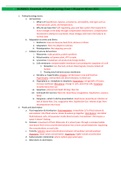
NUR2063 Exam 1 Blueprint
NUR2063 Exam 1 Blueprint NUR2063: Essentials of Pathophysiology Exam 1 Blueprint Winter 2021 1. Pathophysiology basics a. Homeostasis i. What is it? equilibrium, balance, consistency, and stability. vital signs such as blood pressure, pulse, and temperature. ii. Why do we have this? self-regulating, give-and-take system that responds to minor changes in the body through compensation mechanisms. Compensation mechanisms attempt to counteract those changes and return the body to its normal sta...
- Package deal
- Summary
- • 7 pages •
NUR2063 Exam 1 Blueprint NUR2063: Essentials of Pathophysiology Exam 1 Blueprint Winter 2021 1. Pathophysiology basics a. Homeostasis i. What is it? equilibrium, balance, consistency, and stability. vital signs such as blood pressure, pulse, and temperature. ii. Why do we have this? self-regulating, give-and-take system that responds to minor changes in the body through compensation mechanisms. Compensation mechanisms attempt to counteract those changes and return the body to its normal sta...
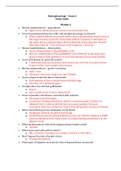
NUR2063 Essentials of Pathophysiology Exam 2 Study Guide
NUR2063 Essentials of Pathophysiology Exam 2 Study Guide Clinical manifestations – appendicitis o Right, lower abdominal pain, nausea, occasional diarrhea ▪ Cause of pseudomembranous colitis and nonpharmacologic treatments- o (Often called antibiotic associated colitis) Acute inflammation and necrosis of the large intestine caused by Clostridium difficile. Exposure to antibiotics is the major factor predisposing to the development of this disorder. Stop the affecting antibiotic. Treat i...
- Package deal
- Summary
- • 9 pages •
NUR2063 Essentials of Pathophysiology Exam 2 Study Guide Clinical manifestations – appendicitis o Right, lower abdominal pain, nausea, occasional diarrhea ▪ Cause of pseudomembranous colitis and nonpharmacologic treatments- o (Often called antibiotic associated colitis) Acute inflammation and necrosis of the large intestine caused by Clostridium difficile. Exposure to antibiotics is the major factor predisposing to the development of this disorder. Stop the affecting antibiotic. Treat i...
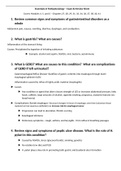
NUR2063 Essentials of Pathophysiology Exam 2 Review
NUR2063 Essentials of Pathophysiology Exam 2 Review Essentials of Pathophysiology – Exam #2 Review Sheet Covers Modules 4, 5, and 6 – Chapters 27, 28, 29, 31, 33, 34, 36, 37, 38, 40, 41 1. Review common signs and symptoms of gastrointestinal disorders as a whole Abdominal pain, nausea, vomiting, diarrhea, dysphagia, and constipation. 2. What is gastritis? What are causes? Inflammation of the stomach lining Causes: Precipitated by ingestion of irritating substances Example: alcoh...
- Package deal
- Summary
- • 22 pages •
NUR2063 Essentials of Pathophysiology Exam 2 Review Essentials of Pathophysiology – Exam #2 Review Sheet Covers Modules 4, 5, and 6 – Chapters 27, 28, 29, 31, 33, 34, 36, 37, 38, 40, 41 1. Review common signs and symptoms of gastrointestinal disorders as a whole Abdominal pain, nausea, vomiting, diarrhea, dysphagia, and constipation. 2. What is gastritis? What are causes? Inflammation of the stomach lining Causes: Precipitated by ingestion of irritating substances Example: alcoh...
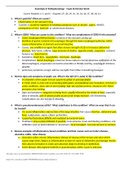
NUR2063 Essentials of Pathophysiology Exam 2 Review Sheet
NUR2063 Essentials of Pathophysiology Exam 2 Review Sheet Dysphagia Difficulty swallowing o Causes Nero disease: Parkinson’s, dementias, muscular dystrophy, Huntington’s, ALS, MN, Guillain Barre Syndrome. Other: Congenital issues/cerebral palsy, Esophageal stenosis, esophageal diverticula, tumors, stroke, achalasia Vomiting – why and consequences Why: protect against substance, reverse peristalsis, increase intracranial pressure, severe pain. Consequences: lead to fluid, electrol...
- Package deal
- Summary
- • 6 pages •
NUR2063 Essentials of Pathophysiology Exam 2 Review Sheet Dysphagia Difficulty swallowing o Causes Nero disease: Parkinson’s, dementias, muscular dystrophy, Huntington’s, ALS, MN, Guillain Barre Syndrome. Other: Congenital issues/cerebral palsy, Esophageal stenosis, esophageal diverticula, tumors, stroke, achalasia Vomiting – why and consequences Why: protect against substance, reverse peristalsis, increase intracranial pressure, severe pain. Consequences: lead to fluid, electrol...
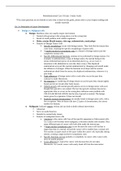
Multidimensional Care II Exam 1 Study Guide
Multidimensional Care II Exam 1 Study Guide to only what is listed on this guide, please refer to your chapter readings and module materials Ch. 21: Principles of Cancer Development Benign vs. Malignant cells o Benign: Harmless; does not usually require intervention Normal cells growing in the wrong place or at the wrong time Result of small problem with cellular regulation Moles, uterine fibroid tumors, skin tags, endometriosis, nasal polyps Features of Benign Tumor...
- Summary
- • 21 pages •
Multidimensional Care II Exam 1 Study Guide to only what is listed on this guide, please refer to your chapter readings and module materials Ch. 21: Principles of Cancer Development Benign vs. Malignant cells o Benign: Harmless; does not usually require intervention Normal cells growing in the wrong place or at the wrong time Result of small problem with cellular regulation Moles, uterine fibroid tumors, skin tags, endometriosis, nasal polyps Features of Benign Tumor...
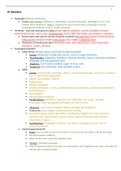
NUR2063 Essentials of Pathophysiology Exam 2 Blueprint
NUR2063 Essentials of Pathophysiology Exam 2 Blueprint Dysphagia Difficulty swallowing o Causes Nero disease: Parkinson’s, dementias, muscular dystrophy, Huntington’s, ALS, MN, Guillain Barre Syndrome. Other: Congenital issues/cerebral palsy, Esophageal stenosis, esophageal diverticula, tumors, stroke, achalasia Vomiting – why and consequences Why: protect against substance, reverse peristalsis, increase intracranial pressure, severe pain. Consequences: lead to fluid, electrolyte...
- Package deal
- Summary
- • 14 pages •
NUR2063 Essentials of Pathophysiology Exam 2 Blueprint Dysphagia Difficulty swallowing o Causes Nero disease: Parkinson’s, dementias, muscular dystrophy, Huntington’s, ALS, MN, Guillain Barre Syndrome. Other: Congenital issues/cerebral palsy, Esophageal stenosis, esophageal diverticula, tumors, stroke, achalasia Vomiting – why and consequences Why: protect against substance, reverse peristalsis, increase intracranial pressure, severe pain. Consequences: lead to fluid, electrolyte...
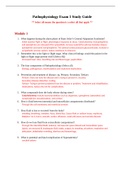
NUR2063 Essentials of Pathophysiology Exam 1 Study Guide
NUR2063 Essentials of Pathophysiology Exam 1 Study Guide ** Select all means the question is a select all that apply ** Module 1 1. What happens during the alarm phase of Hans Selye’s General Adaptation Syndrome? Initial reaction-Fight or flight, physiological response to stress. Catecholamines (norepinephrine and epinephrine are released) (The sympathetic nervous system)The adrenal medulla releases epinephrine and some norepinephrine. The adrenal cortex produces glucocorticoids, increas...
- Package deal
- Summary
- • 12 pages •
NUR2063 Essentials of Pathophysiology Exam 1 Study Guide ** Select all means the question is a select all that apply ** Module 1 1. What happens during the alarm phase of Hans Selye’s General Adaptation Syndrome? Initial reaction-Fight or flight, physiological response to stress. Catecholamines (norepinephrine and epinephrine are released) (The sympathetic nervous system)The adrenal medulla releases epinephrine and some norepinephrine. The adrenal cortex produces glucocorticoids, increas...

PHYSICAL EXAMINATION HEALTH ASSESSMENT TEST BANK
The words are truly set up different, im looking side eye at this test bank
EVOLVE - HESI PHARM- {100%}
PSYC 3002 WEEK 2 QUIZ – QUESTION AND ANSWERS
NURS 6660N MIDTERM EXAM 1 – QUESTION AND ANSWERS {ALREADY GRADED A}
great, thanks
PHIL 347N WEEK 6 CHECKPOINT QUIZ (100%)